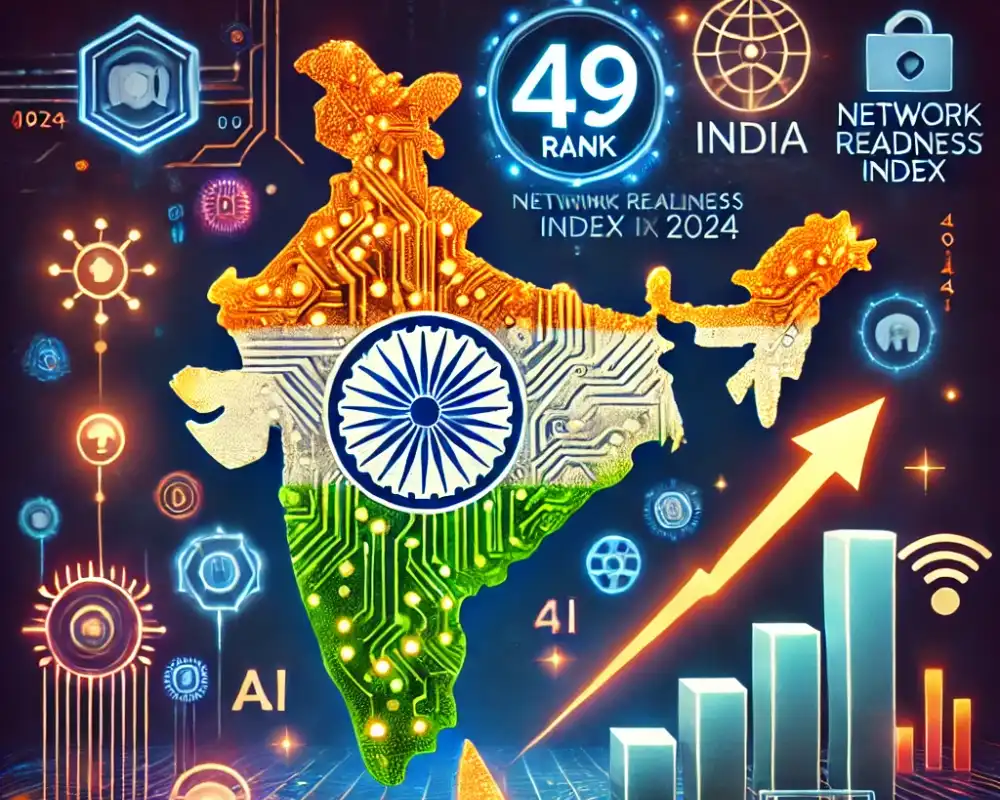India records an impressive position at 49 in NRI 2024. This is quite an impressive feat, eleven places better than 2023, and one that shows the nation is becoming stronger in technology and innovation. This annual index is published by the Washington D.C.-based Portulans Institute and measures how countries use on technology to improve governance, citizenship engagement and improve infrastructure.
India’s Position in International Technology Rankings
India moves from rank 60 to 49 on the NRI, which is a forward-looking indicator of the capacity of countries to exploit the opportunities offered by ICT. In 2023, India scored 49.93. This increased further to 53.63 in 2024, indicating continued initiatives towards developing strong digital infrastructure and focused technology research.
The Ministry of Information and Broadcasting made this a grand celebration, noting that this increase was due in large part to policy interventions in artificial intelligence (AI), mobile networks and fixed-line broadband. The Centre is still according primacy to technology for better governance and ease of living.
What is driving the improvement in India?
Artificial Intelligence progresses
India bets big on AI to address issues across sectors. New-age AI advances are revolutionising healthcare through predictive diagnostics, agriculture through precision farming and governance through data-driven decision-making. The emphasis on AI does not just place India as a global leader in an area of technology, it also creates a substantial economic and social upside.
Expansion of Mobile Networks
India’s technology growth is very technology attached with its telecom industry. Exponentially increased access to 4G and the new 5G technology are making connectivity much better, even in very remote places. These are developments that will now allow us to ensure that all Nigerians anywhere can have access to high-speed internet to participate in the digital economy and e-governance.
Improved Broadband Access
Programmes such as BharatNet are driving down the cost of broadband and extending broadband access to rural and underserved areas. If the government connects villages with high-speed internet, it opens door to millions of citizens to a new life of education, healthcare and business.
Effects of Advancement of Technology in India
Strengthened Economy
India’s rise as per the Network Readiness Index is of critical importance to its economy. Better digital backbone draws FDI triggers innovation, generates employment in services, IT, manufacturing sectors 2019Corporate companies optimize the business process and startups grow on the technology.
World Leadership in Technology
India’s achievements place it at the forefront of technology adoption and innovation. By participating in world research and tech progress, India can further develop its global recognition. Its influence is further bolstered by its cooperation with other countries in fields such as AI and telecommunications.
Increased Digital Inclusion
The government’s attempts to close the digital divide mean even rural and remote folks have a shot at the technology and the life that comes with it. India liberates its people with tools to learn, to work, to connect with others and to achieve all that they want. Such progress is narrowing inequalities and promoting inclusive growth.
Measures Taken to Accomplish this Success
Policy Reforms
The government has implemented a range of policies to stimulate research and development in technology. Programmes such as Digital India seek to turn the country into a digitally empowered society and knowledge economy by promoting e-governance, digital literacy and by further widening Internet usage.
Public-Private Partnerships
As between government and business co-operation the pace of technological progress has quickened. Telecommunications, IT and AI companies collaborate with public agencies to create solutions for national-based challenges. These collaborations encourage innovation and contribute skills to grand projects.
Education and Skill-building Are the Main Priorities
The state knows the focus on education and skill development is what is needed to create the manpower that will fuel the technological revolution. Programs like Skill India are training for modern technologies such as AI, blockchain, and data analytics, paving way for new jobs that are emerging in the digital economy.
The Road Ahead
Maintaining Momentum
To maintain this momentum, India needs to keep up its investment in digital infrastructure and create an environment that encourages innovation. Enhanced cybersecurity and data protection alongside a commitment to ethical use of AI are critical to establish trust and facilitate sustainable growth.
Global Cooperation on the Rise
India needs to further strengthen its relations with other countries and international organizations to share knowledge and resources. Being a part of Global Technology Forums will enable India to share its own experience and learn from the greater experience of the others.
Driving Social Impact
It should rather be that technology is a tool for doing social good. Through leveraging the power of AI and other innovations to help solve problems such as climate change, public health, and education, India can develop solutions that have an impact not only for its citizens but on a global scale.
A Bright Future
India’s increase in the Network Readiness Index is an indication of its focus on technology and innovation. The nation, as it further develops from this base, will see technology drive economic activity, social progress, and global leadership in the years to come.


